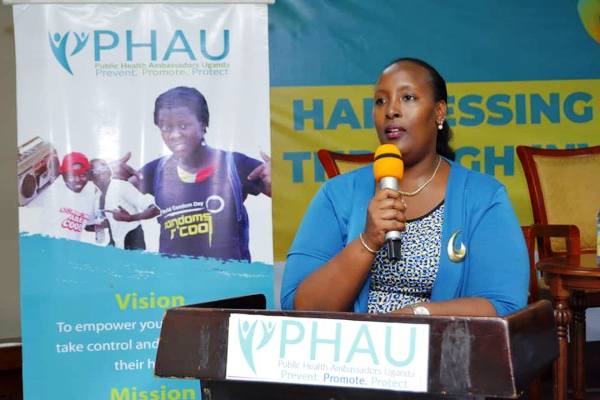Government has been tasked to scale up its family planning efforts if it is to achieve the 2040 vision.
Speaking at Hotel Africana yesterday during the Public Health Youth Symposium organized by Public Health Ambassadors Uganda (PHAU), Hope Nzeire (in featured photo), the Senior National Program Officer National Population Council said it will be hard for Uganda to harness its demographic dividend if it does not invest in the reproductive health needs of both married and unmarried youth.
“Government needs to invest a lot in programs and policies that reduce teenage pregnancies, delay and space births, and prevent the transmission of HIV and other sexually transmitted infections among young people. Removing barriers to family planning and reproductive health information will bring down the fertility rate and reduce the number of dependents,” Nzeire said.
Organized under the theme “Working Towards Sustainable Development: Harnessing the Demographic Dividend Through Investing in Uganda’s Youth”, the symposium brings together public health professionals to communicate, connect and collaborate on the latest public health efforts and findings.
It is a gathering of public health practitioners and multiple partners from government, academia and private organizations that share a common interest and dedication in protecting, preventing and promoting the health of the nation.
Nzeire explained that sustainable development and economic growth as a promise of a demographic dividend can only be achieved by implementing new, forward-looking strategies that promote youth engagement, inclusion and representation socially, economically and politically.

“For a demographic dividend to occur, a window of opportunity created by reductions in child mortality and sustainable fertility rates through enhanced use of contraception directly translates into a demographic shift to fewer dependents that can be comfortably taken care of by the working age population. This way we can get to reverse the pyramid shape of our population with more productivity that will turn around the fortunes of our economy as a country,” she noted.
She further emphasized the need for government to invest more in child survival.
“There is need for the government to focus more on simple child survival interventions like immunization and nutrition education so that the infant mortality rate reduces.
There are many women in rural areas who give birth to many children because they are not sure of their survival and this in turn increases the number of dependents. Reducing child deaths stimulates a desire for smaller, healthier families and thus an impetus for economic growth,” Nzeire added.
The symposium attracted health practitioners from Uganda Health Marketing Group (UHMG), Profam Uganda, Jhpiego, Makerere School of Public Health, PSI Uganda and PITCH (Partnership To Inspire, Transform And Connect HIV Response) Project.






